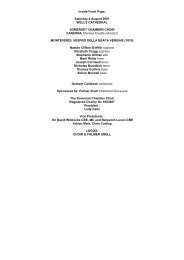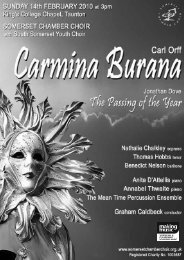Click here to view the concert programme - Somerset Chamber Choir
Click here to view the concert programme - Somerset Chamber Choir
Click here to view the concert programme - Somerset Chamber Choir
Create successful ePaper yourself
Turn your PDF publications into a flip-book with our unique Google optimized e-Paper software.
Ev’n like two little bank divided brooks,That wash <strong>the</strong> pebbles with <strong>the</strong>ir wan<strong>to</strong>n streams,And having ranged and searched a thousand nooksMeet both at length at silver-breasted ThamesW<strong>here</strong> in a greater current <strong>the</strong>y conjoin:So I my best-beloved’s am,So he is mine!Virtually unknown in his lifetime, Gerard Manley Hopkins (1844-1889) is now regarded as one of <strong>the</strong> three or fourgreatest poets of <strong>the</strong> Vic<strong>to</strong>rian era. His poetry is available <strong>to</strong> us <strong>to</strong>day only because it was collected and published by <strong>the</strong>poet Robert Bridges and o<strong>the</strong>r friends of Hopkins in 1918, almost twenty years after his death.At 22 Hopkins converted from <strong>the</strong> Church of England <strong>to</strong> <strong>the</strong> Catholic Church, being received t<strong>here</strong> by John HenryNewman, who himself had been received in<strong>to</strong> <strong>the</strong> Catholic Church in 1845. He later joined <strong>the</strong> Jesuit Order. Hopkins'output of intense, deeply felt religious poetry quickened after 1875, when he wrote The Wreck of <strong>the</strong> Deutschland, about<strong>the</strong> heroic sacrifice of a group of German nuns who were crossing <strong>the</strong> North Sea <strong>to</strong> England when <strong>the</strong>ir boat sank in as<strong>to</strong>rm. His mental and physical health were always fragile and he died in Dublin in 1889, aged 44.Mervyn Cooke has written:Ev’n so we met, and after long pursuit,Ev’n so we joined. We both became entire.No need for ei<strong>the</strong>r <strong>to</strong> renew a suit,For I was flax, and he was flames of fire.Our firm united souls did more than twine.So I my best-beloved’s am;So he is mine.If all those glittering monarchs that commandThe servile quarters of this earthly ballShould tender in exchange <strong>the</strong>ir shares of land,I would not change my fortunes for <strong>the</strong>m all:Their wealth is but a counter <strong>to</strong> my coin:The world’s but <strong>the</strong>irs;But my beloved’s mine.BrittenA.M.D.G. (Ad maiorem Dei gloriam)Nor time, nor place, nor chance, nor death can bowMy least desires un<strong>to</strong> <strong>the</strong> least remove;He’s firmly mine by blood, I his by vow;He’s mine by faith, and I am his by love.He’s mine by water, I am his by wine;Thus I my best-beloved’s am,Thus he is mine.He is my altar, I his holy place,I am his guest, and he my living food.I’m his by penitence, he mine by grace;I’m his by purchase, he is mine by blood.He’s my supporting elm, and I his vine:Thus I my best-beloved’s am,Thus he is mine.He gives me wealth: I give him all my vows;I give him songs, he gives me length of days.With wreaths of grace he crowns my longing brows,And I his temples with a crown of praise,Which he accepts: an everlasting sign,That I my best-beloved’s am,That he is mine.Francis Quarles 1592-1644 (from Emblemes, 1635)“In spite of an as<strong>to</strong>nishing technical facility which might have led a less discriminating composer astray, <strong>the</strong> young Brittenexercised a rigorous policy of self-criticism which inevitably resulted in his withdrawing several of his early works fromcirculation soon after <strong>the</strong>ir composition. In some cases, most notably <strong>the</strong> American operetta Paul Bunyan (1941), <strong>the</strong>suppression was due <strong>to</strong> poorly received performances; but it is difficult <strong>to</strong> know exactly why Britten withdrew <strong>the</strong> sevensettings of poems by Gerard Manley Hopkins entitled A.M.D.G., which were never performed in <strong>the</strong> composer’s lifetime.Sketched in August 1939, shortly after Britten’s arrival in <strong>the</strong> United States, <strong>the</strong> songs were originally intended forperformance by Pears’s ‘Round Table Singers’ in London during November of that year. Possibly <strong>the</strong> decision <strong>to</strong> remainin <strong>the</strong> USA for several years influenced Britten <strong>to</strong> abandon <strong>the</strong> project before he had made a fair copy of <strong>the</strong> manuscript.The première was planned for November 1939, at <strong>the</strong> Aeolian Hall, London; work on <strong>the</strong> piece seems <strong>to</strong> have beenabandoned at <strong>the</strong> outbreak of war, though nos 1, 2, 5 and 7 were performed in America at untraced <strong>concert</strong>s some timebefore 1942 - t<strong>here</strong> are copies of <strong>the</strong>se numbers in Pears's hand, made for use by a small group of solo singers formedby Pears in <strong>the</strong> USA. It was only as recently as 1984 that A.M.D.G. was given its first performance, and <strong>the</strong> work was finallypublished in 1989.The initials A.M.D.G. stand for a famous mot<strong>to</strong> of <strong>the</strong> Jesuits - Ad maiorem Dei gloriam (‘<strong>to</strong> <strong>the</strong> greater glory of God’).Hopkins had joined this sect in his early twenties and several of his poems, including O Deus, ego amo te (set by Britten),bear this mot<strong>to</strong> in <strong>the</strong>ir manuscripts. Britten’s setting of Prayer I (Jesu that dost in Mary dwell) indulges in a harmonicrichness absent from some of <strong>the</strong> o<strong>the</strong>r more frugal settings, and is followed by Rosa mystica, a ternary waltz in whichparallel thirds are set against a pedal point in ostina<strong>to</strong> rhythms. God’s grandeur contains fugal elements and graphicchromatic depiction of <strong>the</strong> words ‘bleared’ and ‘smeared’. The preoccupation of Prayer II (Thee, God, I come from, <strong>to</strong> <strong>the</strong>ego) is simple octave doublings, and this directness is maintained in O Deus, ego amo te, w<strong>here</strong> <strong>the</strong> music consists almostentirely of root-position major triads in unmeasured speech rhythms. The interval of a third returns <strong>to</strong> dominate <strong>the</strong>march-like setting of The soldier, and <strong>the</strong> final song - Heaven-Haven - sets one of Hopkins’s earliest poems <strong>to</strong> musicof <strong>the</strong> utmost simplicity.”- 9 -












